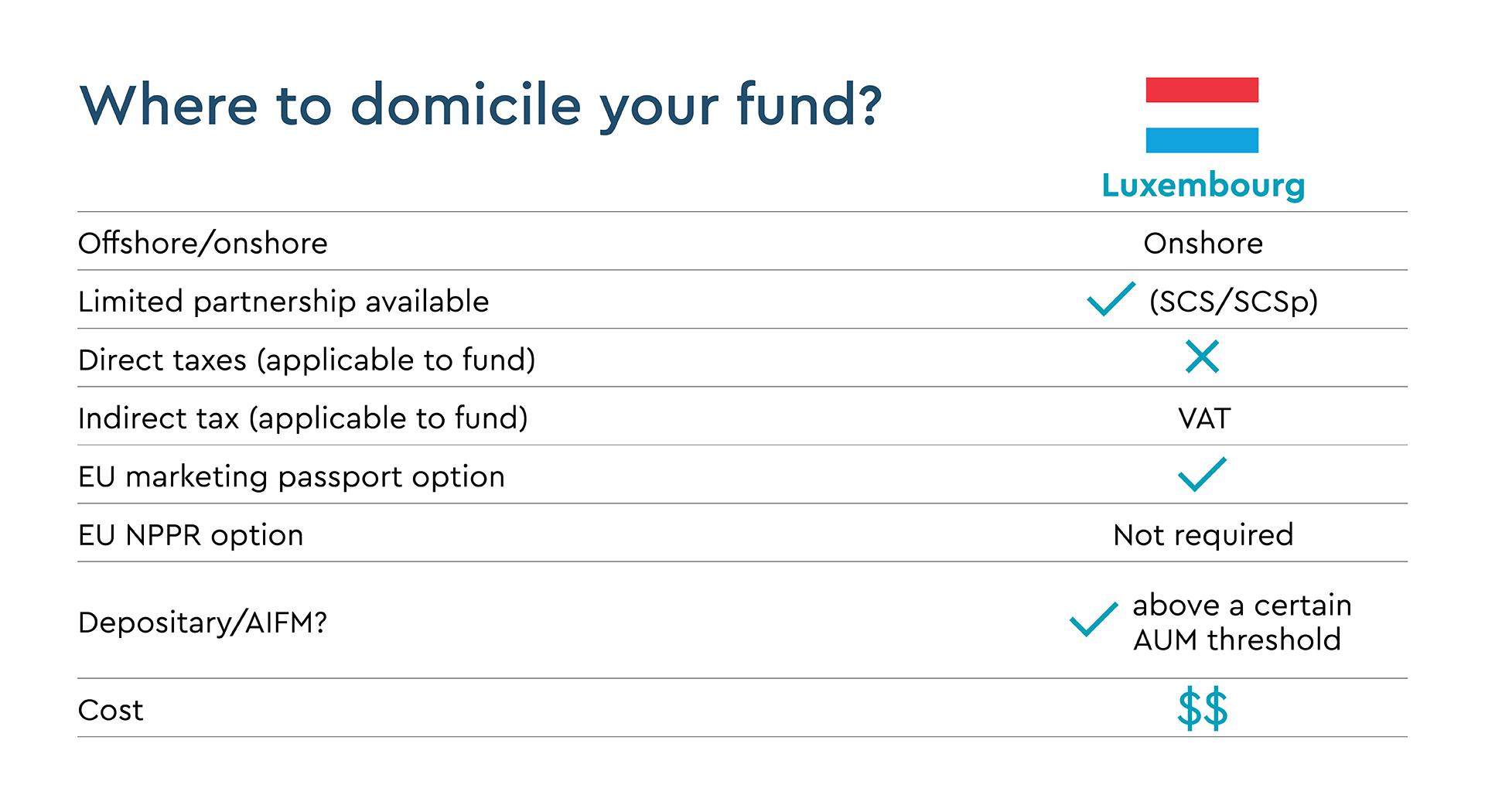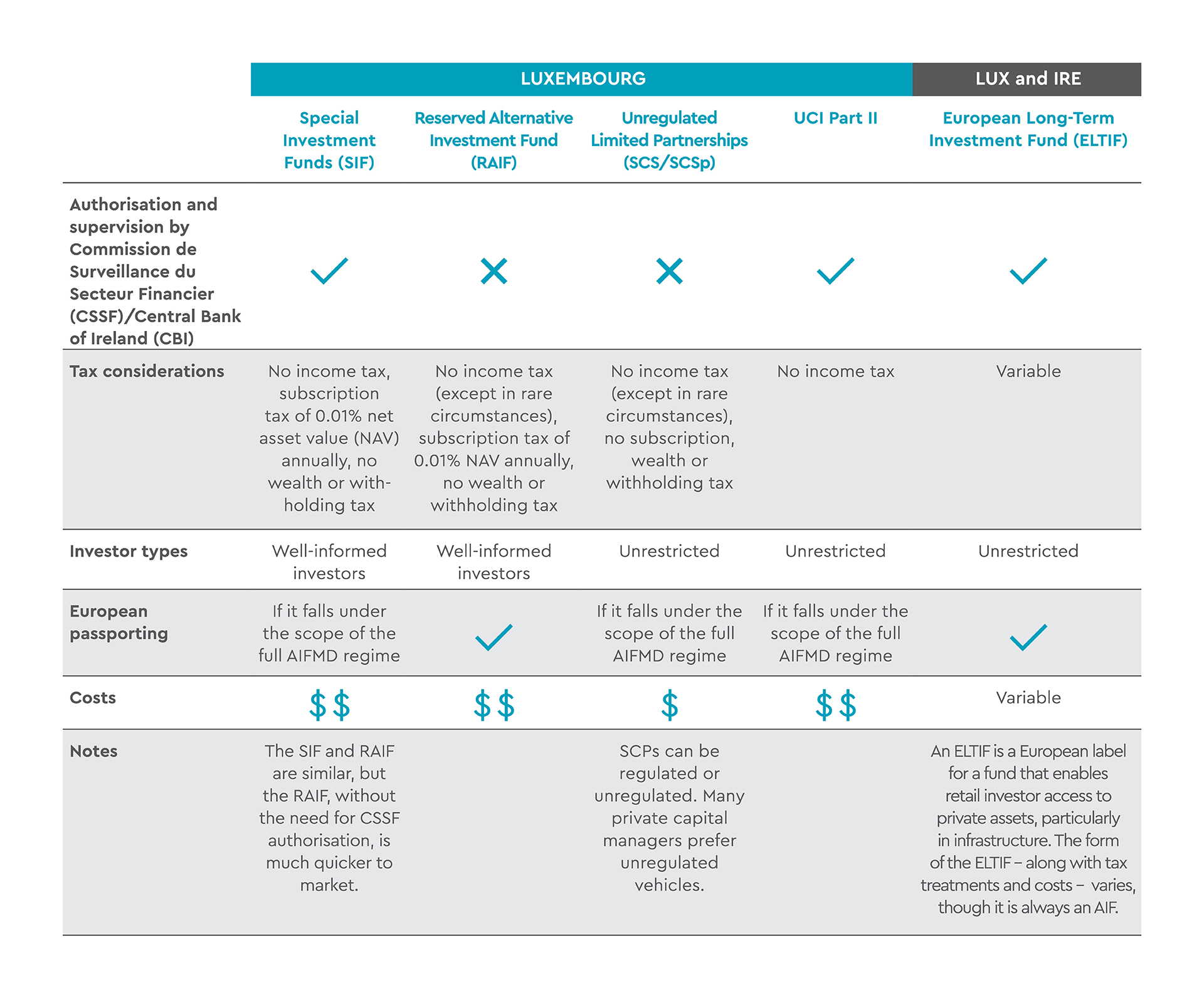
Luxembourg is the number one destination for alternative investment funds (AIFs), attracting fund managers and investors worldwide, catering to a broad range of private assets, including private equity, credit, real estate, and infrastructure investments.
The jurisdiction's appeal lies in its versatile "toolbox" of legal and regulatory frameworks, which can accommodate different types of investment strategies. This flexibility allows fund managers to select the most appropriate structures for their specific needs, whether they are dealing with private equity, credit arrangements, or infrastructure projects.
In this article, Thomas Fahl, Peter Corry and Declan Ryan from Ocorian’s Luxembourg Fund Services Team in Luxembourg dive into the specifics of establishing alternative investment funds in the Grand Duchy.
Why set up an alternative investment fund in Luxembourg?
Luxembourg's combination of regulatory familiarity, flexible legal structures, tax benefits, political and economic stability, and a supportive, multilingual ecosystem makes it a top choice for domiciling funds.
Additionally, Luxembourg is renowned for its stringent anti-money laundering and know-your-customer practices, further solidifying its reputable standing, which was confirmed by the results of the recent field-visit by the OECD’s Financial Action Task Force (FATF) covering the matter.
Here are some of the key reasons why Luxembourg is the premier jurisdiction for establishing private assets funds:
Versatile fund structures
Luxembourg is often referred to as offering a "toolbox" for fund structures, providing a spectrum of regulated and unregulated options, including the popular Special Limited Partnership (SCSp) that mirrors the features of widely-established Anglo-Saxon GP/LP vehicles. This flexibility allows investment managers to tailor fund structures to specific needs, facilitating complex setups like sub-funds or compartments without significant regulatory hurdles.
Tax efficiency and economic stability
The jurisdiction also offers favourable tax arrangements for corporate vehicles underpinning funds, enhancing its attractiveness as a financial hub, with its extensive network of so-called double-tax treaties as a basis for the country’s reputation as hub for the structuring of cross-border transactions. Moreover, Luxembourg boasts a stable political and economic environment, supported by a government and regulatory body known for their compliance-focused yet supportive nature. The country’s small size and approachability enable direct interactions with regulators and tax authorities, a rare convenience in larger jurisdictions.
Strong funds ecosystem
Luxembourg’s AAA rating underscores its financial stability, appealing to those seeking a secure investment environment. The country hosts a comprehensive ecosystem, including specialized banks, administration houses, and legal and auditing services, all within a multilingual environment that eases operations for international investors.
The choice of Luxembourg is often straightforward for fund managers due to its established reputation, comprehensive ecosystem, and the questioning it avoids from investors familiar with its regulatory environment.
That being said, the cost of operations in Luxembourg may be higher compared to some other jurisdictions, which is a factor that fund managers need to consider. Despite this, the benefits of operating in Luxembourg, such as its regulatory framework, flexibility in fund structures, and the supportive environment for private assets, clearly outweigh these costs.

What type of fund structures are available in Luxembourg?

In Luxembourg, a variety of fund structures are utilised, particularly catering to the needs of private assets management. One of the most dominant structures in this space is the unregulated limited partnership, specifically the Special Limited Partnership (SCSp). This structure is highly favoured due to its flexibility and lighter regulatory burden, making it ideal for private equity, real estate, and other private asset investments.
Historically, regulated funds were more common, but the trend has shifted towards unregulated fund structures with the introduction of Luxembourg’s Reserved Alternative Investment Fund (RAIF) regime in 2016. This shift is largely due to the regulatory focus being more on the fund managers rather than the funds themselves, under frameworks like the Alternative Investment Fund Managers Directive (AIFMD).
The RAIF regime offers a quick time to market due to its regulatory framework that requires supervision at the manager level rather than the fund level. This regime is particularly attractive for managers who want to utilise typical investment fund features such as setting of various sub-funds or compartments under a so-called umbrella in the form of an unregulated vehicle.
What are the key things you should know before setting up a fund in Luxembourg?
Pre-marketing and strategy testing
Before committing to setting up a fund, it's crucial to test the market and gauge interest in the investment strategy. Luxembourg offers pre-marketing solutions that allow managers to explore the potential traction of their fund concept without full-scale launching. This step helps in confirming there is a solid interest base before proceeding.
Choosing service providers:
Setting up a fund requires collaborating with various service providers including legal advisors, banks, and possibly tax advisors. It's important to select partners who are experienced in Luxembourg's fund industry to ensure compliance and smooth operation.
Banking relationships:
One of the practical steps in setting up a fund is establishing banking relationships in Luxembourg. Setting up bank accounts can be time-consuming, and it's advisable to start this process early.
Regulatory compliance and KYC:
Compliance with Know Your Customer (KYC) and other regulatory requirements is crucial. This can be a detailed and demanding process, especially for new entrants to the Luxembourg market. Ensuring that all regulatory aspects are handled correctly is essential for the successful launch and operation of the fund.
Timeline considerations:
Typically, a minimum of three months should be allowed from the decision to establish a fund to having it operational. This timeline can extend depending on various factors such as the complexity of the fund structure and the efficiency of service providers.
Collaboration and coordination:
While some service providers can handle multiple aspects of the fund setup process, there is no "one-stop-shop" solution that covers everything. Effective coordination among different partners—legal, banking, marketing, and management—is key to a successful fund launch.
Understanding roles and limitations:
It’s important for fund managers to clearly understand what each partner can and cannot do within the regulatory framework. This understanding helps in assigning responsibilities and ensures that all necessary tasks are covered without overlap or omission.
By considering these factors and asking the right questions during the setup process, fund managers can navigate the complexities of establishing a fund in Luxembourg more effectively. Choosing the right partners and giving careful attention to regulatory and operational details are crucial steps towards a successful fund launch.
AML/KYC regulations in Luxembourg
In terms of specific regulatory obligations when setting up a fund in Luxembourg, a key focus is on Anti-Money Laundering and Know Your Customer (AML/KYC) compliance. While not a regulatory requirement unique to funds, AML/KYC is a critical aspect of the regulatory framework in Luxembourg and is rigorously enforced. Luxembourg prides itself on maintaining high standards in this area, which contributes to its reputation as a leading financial centre with robust compliance measures.
AML/KYC requirements are integral to ensuring the integrity of financial transactions and preventing illicit activities such as money laundering and terrorist financing, both on the investor side and the asset side of the funds. For fund managers, this means undergoing thorough due diligence processes both for themselves and their investors, as well as ensuring that adequate AML procedures are in place to cover the investment activity of the funds, including a daily name screening. On the investor side, the process involves verifying the identities of investors, understanding the nature of their funds, and continuously monitoring transactions for any suspicious activities. On the asset side, screenings for international sanctions and other factors need to cover the asset and a variety of parties and persons, depending on its nature.
Luxembourg's emphasis on high AML/KYC standards is part of its broader strategy to maintain a clean and reputable financial sector. This rigorous approach to compliance does create additional administrative work for fund managers and investors, but it also provides reassurance that the financial environment is secure and well-regulated. Investors can feel confident that they are participating in a market that is not only efficient but also operates with high ethical standards.
For fund managers, it's important to enter the Luxembourg market with a clear understanding of these obligations and to prepare for the detailed compliance work that will be required. Working with experienced local advisors and service providers can help navigate these requirements effectively and ensure that the fund meets all regulatory standards from the outset.
What is required to get a fund established/approved in Luxembourg?
Establishing and gaining approval for a fund in Luxembourg involves a comprehensive process that requires the coordination of various key parties and the preparation of numerous documents and agreements. Here’s a detailed checklist to guide you through the necessary steps:
Appointment of key parties
To ensure proper management and compliance, the following parties must be appointed:
- Alternative Investment Fund Manager (AIFM): Oversees the fund's operations and compliance with regulatory requirements.
- Depositary: Responsible for the safekeeping of the fund's assets.
- Fund administrator: Manages the day-to-day operations and administration of the fund.
- Transfer agent: Handles the issuance and redemption of the fund’s shares.
- Investment manager/Sub-investment Manager: Makes investment decisions on behalf of the fund.
- Prime Broker (if applicable): Provides services like lending, leverage, and clearing.
- Legal advisor: Ensures the fund complies with legal and regulatory requirements.
- Auditor: Conducts the fund’s financial audits.
- Company secretary: Manages governance and compliance matters.
- Money Laundering Reporting Officer or so-called “Responsable du Respect des Obligations” (MLRO or RC): Ensures compliance with anti-money laundering regulations.
- Directors: Oversee the fund’s operations and ensure it meets its governance obligations.
AIF setup list – material contracts
The establishment of a fund requires the drafting and signing of several critical contracts:
- AIFM Agreement
- Investment Management Agreement
- Depositary Agreement
- Administrative Agreement
- Transfer Agency Agreement
- Investment Advisory Agreement
- Distribution/Paying Agent Agreement
- Prime Broker Agreement (if applicable)
- Sub-Depositary Agreement
Required documents
For regulated fund vehicles, a set of specific documents must be prepared and submitted for regulatory approval:
- Directors’ letter of application: Formal request to establish the fund.
- Completed application form: Must be filled out with details about the fund.
- Prospectus/private placement memorandum plus any supplements: Detailed information about the fund’s investment objectives, strategies, and risks.
- Constitutional documents of the Fund: Includes articles of association and other foundational documents.
- Certificate of incorporation: Official document that forms the legal entity of the fund.
Tax registration
Proper tax registration is crucial for the fund’s operation:
- Corporation tax registration
- VAT registration
- Director/Employee/PAYE registration
Each of these steps involves detailed preparation and coordination with various financial, legal, and regulatory bodies. Ensuring that all these elements are correctly handled is essential for the smooth approval and operation of a fund in Luxembourg.
Ocorian Fund Services in Luxembourg
At Ocorian we have extensive experience supporting fund managers with setting up alternative investment funds in Europe and administering them throughout their lifecycle.
We have teams across seven jurisdictions in Europe that provide a high-touch, technology-first approach combined with local expertise.
We offer a full service offering from fund set up and administration through to fund accounting, AIFM, investor services and depositary.
- Fast and efficient setup of funds and SPVs in Europe
- Teams based in the UK, Jersey, Guernsey, Ireland, The Netherlands and Luxembourg
- AIFM in Ireland and Luxembourg
- Expertise in administering vehicles parallel to existing US or Cayman structures
- Jurisdiction agnostic
- Full-service provider
Our business development team will be happy to discuss your requirements and guide you through the process. Contact us for more information.


